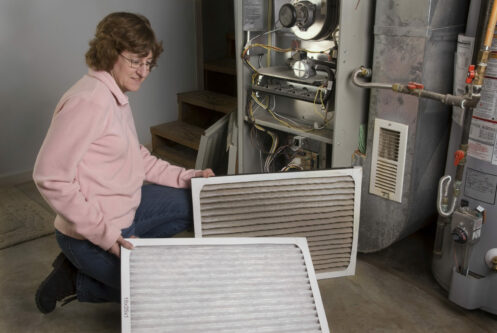
During the winter months, you heavily rely on your furnace to keep your household warm and comfortable. It’s likely that you’re so used to your heater working at the flip of a switch that you don’t even consider that one day it could stop working altogether. Even with the best maintenance tune-ups and consistent attention to every little change your heating system makes, eventually, your system will meet its end.
So the question is, how long are furnaces supposed to last? Let’s do a deep dive into how long your furnace should last and what you can do to prevent it from breaking down too soon.
How Long Should Your Furnace Last?
So, around what age range should you expect your furnace to start naturally breaking down? The lifespan of a furnace can vary depending on several factors, including the type of furnace, type of filters used, filter change schedule, and annual maintenance with a licensed HVAC technician. On average, a well-maintained gas furnace can last between 10 to 20 years.
Proper maintenance, such as regular filter replacement and professional inspections, can significantly extend a furnace’s lifespan. The quality of the furnace and its initial installation, and the local climate can also play essential roles in determining how long it should last. Ultimately, keeping your furnace in good condition and addressing issues promptly can help ensure it reaches its full potential lifespan.
What Affects Their Lifespan?
The longevity of a furnace system is subject to various factors that can either prolong or shorten its lifespan. To begin with, the quality of the furnace’s initial installation plays a crucial role, as a properly installed system is more likely to have a longer lifespan.
The make and model of the furnace is another determining factor. All furnace manufacturers have different models and each furnace model has its own quality of components. Also important, a properly sized furnace for a home will perform more efficiently than an over-sized or under-sized furnace.
Regular maintenance by a licensed HVAC technician is vital for extending a furnace’s life. Equally important are routine tasks such as keeping the furnace vents clear or snow and other obstructions and regular furnace filter replacements.
In summary, maintaining and considering these various factors is critical to maximizing the longevity of a furnace system.
Signs Your Furnace Is Aging Out
How do you know if your furnace is aging out? It’s possible the furnace that came with the home when you bought it, and you might not know its past or when it was installed. Recognizing when your furnace is wearing out is essential for ensuring your home’s comfort and safety.
One common sign of a furnace reaching the end of its lifespan is reduced efficiency; if your energy bills have been steadily rising despite consistent usage, it may be time to consider a replacement.
You may also notice unusual noises, such as banging, rattling, or squealing. These can also indicate mechanical problems and wear and tear within your furnace system.
If you need frequent repairs or experience breakdowns, these are clear indicators that your furnace may be on its way out.
Knowing how old your furnace is can make all the difference, too. If it’s over 15 years old, calling a professional team like Metro Air Limited is definitely a good idea, as older units are not only less efficient but can potentially pose safety risks.
How to Extend Your Furnace’s Lifespan
Want to extend your furnace’s overall longevity? Regular maintenance is key to achieving this goal. A professional HVAC technician can replace air filters, measure efficiency levels, check dangerous CO levels and tighten up loose fittings. You can schedule annual professional inspections so an HVAC technician can identify and address potential issues before they worsen.
What Else Can I Do To Make My Furnace Last Longer?
Another thing you can do to extend the life of your furnace system is to schedule annual maintenance for your air conditioner. Many people don’t realize that an air conditioner has 2 components. Most are aware of the unit outside your home but there’s another important component inside your home. It is located in the ducting above your furnace. This second component houses the air conditioner coil. This coil produces condensation and, if the drainage tube is not kept clear, the water could back up and drip onto your furnace circuit boards thereby damaging them and causing an expensive repair. This water could also cause rust inside the furnace causing premature aging of your furnace.
Another important item that is missed by most homeowners is changing the furnace filters during the summer. A dirty furnace filter will cause the furnace fan to work harder to push air through it.
A dirty furnace filter will also cause your air conditioner coil to ice up. If this happens, you would need to turn off your air conditioner to allow the ice to melt and this water could drip into your furnace causing damage and rust.
Keep Your Furnace Lasting Long with Metro Air Limited!
The lifespan of your furnace is a critical consideration for keeping a warm and comfortable home during the winter months. While eventually your furnace will expire, understanding the average lifespan and the factors affecting it can help it last longer.
Regular maintenance by a licensed HVAC technician, frequent filter replacement, and keeping the vents clear of blockages can all play a role in extending your furnace’s life. By staying vigilant and proactive, you can help ensure your furnace reaches its full potential lifespan, saving you money and providing reliable heating for years to come.
When you need furnace maintenance services or you are ready to replace your furnace with one that is more energy efficient and provides more even heat for your home, give Metro Air Limited a call!

